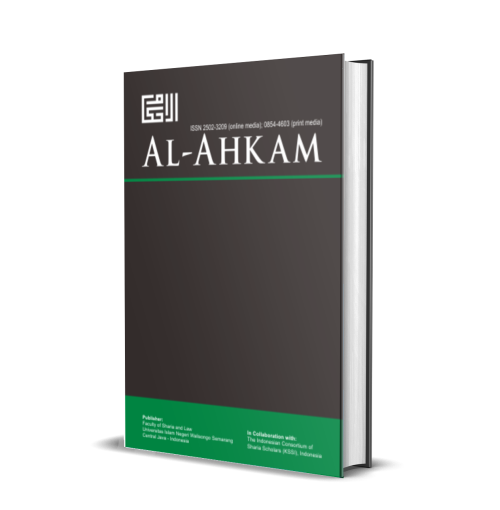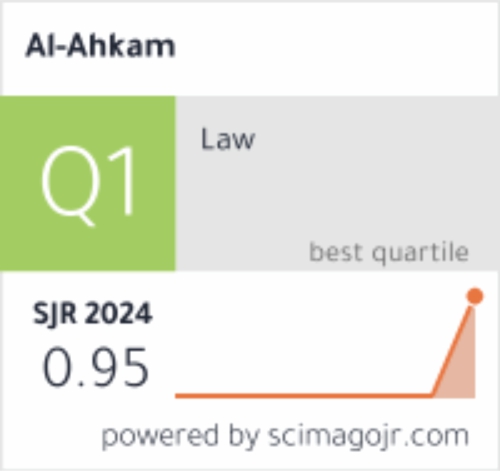An Empirical Approach in Culinary Fiqh of Coastal Communities: Critical Study of ‘Aysh al-Baḥr
DOI:
https://doi.org/10.21580/ahkam.2023.33.1.14523Keywords:
culinary fiqh, coastal communities, ‘Aysh al-Baḥr, Kiai Anwar BatangAbstract
The lives of fishermen are said to have a profound influence on the lives of coastal towns. Their attitude toward marine resources effects their theological perspective as well. This fact is supported by Kiai Anwar's book ‘Aysh al-Baḥr, which discusses the legal position of consuming numerous aquatic animals. This article seeks to trace the book ‘Aysh al-Baḥr's understanding of culinary fiqh. As an analytical tool, this paper employs a normative approach and the notion of Islamic epistemology pioneered by al-Jābirī and Mulyadhi. This article demonstrates how the epistemology of culinary fiqh in ‘Aysh al-Baḥr employs an empirical approach to determining the legal status of ingesting animals by viewing and direct observing them. Kiai Anwar's background as a fisherman gives him an edge in developing normative and empirical reasons for marine animal laws. This conclusion demonstrates that coastal cultures have an extensive understanding of aquatic animal environments. This article suggests utilizing empirical approaches to derive rules that necessitate direct observation.
__________
The original draft of this article has been presented at the 20th Annual International Conference on Islamic Studies (AICIS), Surakarta, 2021.
Downloads
References
Abu-Rabi’, Ibrahim M. “Toward a Critical Arab Reason: The Contributions of the Moroccan Philosopher Muḥammad ’Ābid al-Jābirī.” Islamic Studies 42, no. 1 (2013): 63–95. http://www.jstor.org/stable/20837251.
Amamou, Hayat. “The Nature of Early Islamic Sources and the Debate over their Historical Significance.” Al-Muntaqa 1, no. 2 (2018): 68–79. https://doi.org/10.31430/almuntaqa.1.2.0068.
Anwār, Muḥammad. ‘Aysh al-Baḥr fī Bayān al-Ḥayawān alladhī lā Ya’īsu illā fī al-Baḥr wa alladhī Ya’īsu fī al-Barr wa al-Baḥr. Batang, 1920.
Arka, Ida Bagus. “Tradisi Hidangan Olahan Asal Bulus dan Analisis Nilai Gizinya.” Jurnal Veteriner 1, no. 1 (2020): 24–31. https://ojs.unud.ac.id/index.php/jvet/article/download/22895/15022/.
Asmawi, Asmawi. “Epistemologi Hukum Islam: Perspektif Historis, Sosiologis Dalam Pengembangan Dalil.” Tribakti: Jurnal Pemikiran Keislaman 32, no. 1 (2021): 57–76. https://doi.org/10.33367/tribakti.v32i1.1393.
al-Bār, Ibn ‘Abd. Al-Kāfī fī Fiqh Ahl al-Madīnah al-Mālikī. Bairūt: Dār al-Kutub al-‘Ilmiyyah, 1992.
Damanhuri, Damanhuri. “Kitab Kuning: Warisan Keilmuan Ulama dan Kontekstualisasi Hukum Islam Nusantara.” Jurnal ‘Anil Islam 10, no. 2 (2017): 234–61.
Dumīrī, Muḥammad bin Mūsa al-. Ḥayāh al-Ḥayawān al-Kubrā. Bairūt: Dār al-Kutub al-‘Ilmiyyah, 1992.
Fadal, Kurdi. “’Aisy al-Bahr: Karya Intelektual Ulama Pesisir Jawa Awal Abad XX M Seputar Hewan Laut.” Jurnal Lektur Keagamaan 18, no. 2 (2020): 303–32. https://doi.org/10.31291/jlk.v18i2.792.
Horowitz, Donald L. “The Qur’an and the Common Law: Islamic Law Reform and the Theory of Legal Change.” The American Journal of Comparative Law 42, no. 3 (2014): 543–80. https://doi.org/10.2307/840701.
Hurgronje, Snouck. Mekka in the Latter Part of the 19th Century. Leiden: E.J. Brill, 1931.
al-Jābirī, Muḥammad ‘Ābid. Bunyah al-‘Aql al-‘Arābī. Bairūt: Markaz Dirāsat al-Wahdah al-‘Arabiyyah, 2009.
al-Jazāyrī, ‘Abd Raḥmān. Kitāb al-Fiqh ‘alā al-Madhāhib al-Arba’ah. Bairūt: Dār al-Kutub al-‘Ilmiyyah, 2003.
Kamali, Mohammad Hashim. “Legal Maxims and Other Genres of Literature in Islamic Jurisprudence.” Arab Law Quarterly 20, no. 1 (2016): 77–101. http://www.jstor.org/stable/27650538.
Kartanegara, Mulyadhi. Reaktualisasi Tradisi Ilmiah Islam. Jakarta: Baitul Ihsan, 2006.
Kern, R.A. “Pasantren.” in Shorter Encyclopedia of Islam Leiden. Leiden: EJ Brill, 1953.
Khalilieh, Hassan S. “Human Jettison, Contribution for Lives, and Life Salvage in Byzantine and Early Islamic Maritime Laws in the Mediterranean.” Byzantion 75, no. 2 (2015): 225–35. http://www.jstor.org/stable/44172998.
al-Lāhim, ‘Abd al-Karīm Muḥammad. Al-Maṭla’ ‘alā Daqā'iq Zād al-Mustaqni.’ Riyāḍ: Dār Kunūz Ishbiliyā, 2012.
Layish, Aharon. “Islamic Law in the Modern World: Nationalization, Islamization, Reinstatement.” Islamic Law and Society 21, no. 3 (2014): 276–307. http://www.jstor.org/stable/43304512.
Loy, Nikolaus. Melancong ke Laut: Tata Kelola Pariwisata Maritim Indonesia. Jakarta: PT. Gramedia, 2019.
Luth, Thohir, Siti Rohmah, Nur Chanifah, dan Moh Anas Kholish. “Coastal Ulama Ijtihād and Destructive Fishing Prevention in Indonesia.” Ahkam: Jurnal Ilmu Syariah 22, no. 2 (2022). https://doi.org/ 10.15408/ajis.v22i2.28077.
Masud, Muhammad Khalid. “Teaching of Islamic Law and Sharī’ah: A Critical Evaluation of the Present and Prospects for the Future.” Islamic Studies 44, no. 2 (2015): 165–89. http://www.jstor.org/stable/20838960.
al-Māwardī, Abū al-Ḥasan. Al-Ḥāwī al-Kabīr fī Fiqh Madhhab al-Imām al-Shāfi’ī. Bairūt: Dār al-Kutub al-‘Ilmiyyah, 1994.
Mukhtār, Muḥammad. Al-Shawā'iq al-Muḥriqah li al-Awhām al-Kādhibah fī Bayān Ḥāl al-Balūt. Kediri: al-Ma’had al-Islāmy Lirboyo, 2006.
Mun’im, Zainul. “Etika Lingkungan Biosentris dalam al-Quran: Analisis Tafsir Pelestarian Lingkungan Hidup Karya Kementerian Agama.” Suhuf 15, no. 1 (2022): 197–221. https://doi.org/10.22548/shf.v15i1.720.
Mun’im, Zainul. “Peran Kaidah Fikih dalam Aktualisasi Hukum Islam: Studi Fatwa Yusuf al-Qaradawi tentang Fiqh al-Aqalliyat.” Al-Manahij: Jurnal Kajian Hukum Islam 15, no. 1 (2021): 151–72. https://doi.org/10.24090/mnh.v15i1.4546.
Mun’im, Zainul. “The Epistemology of MUI’s Fatwas on COVID-19: Bayani and Burhani Eclecticism.” Al-Istinbath : Jurnal Hukum Islam 7, no. 1 (2022): 1. https://doi.org/10.29240/jhi.v7i1.3216.
Musa, Khadiga. "Legal Maxims as a Genre of Islamic Law: Origins, Development, and Significance of al-Qawāʿid al-Fiqhiyya." Islamic Law and Society 21, no. 4 (2014): 325–65. http://www.jstor.org/stable/43304518.
Mustofa, Mahmud Yunus. “Transmisi Pendidikan Fiqih Nusantara pada Masyarakat Pesisir (Telaah Kitab Aisyul Bahri Karya Kiai Anwar Batang).” Universitas Wahid Hasyim, 2019.
al-Nawāwī, Muḥyi al-Dīn bin Sharf. Kitāb al-Majmū’ Sharḥ al-Muhadhdhab. Jiddah: Maktabah al-Irsyād, 2007.
Powers, David S. “Wael B. Hallaq on the Origins of Islamic Law: A Review Essay.” Islamic Law and Society 17, no. 1 (2020): 126–57. http://www.jstor.org/stable/25704003.
Purwanto, M. Ngalim. Psikologi Pendidikan. Bandung: Remaja Rosdakarya, 1990.
al-Qaraḍāwī, Yūsūf. Al-Ijtihād fī al-Sharī’ah al-Islāmiyyah ma’a Naẓarāt Taḥlīliyah. Kuwait: Dār al-Qalm, 1996.
al-Qurṭubī, Muḥammad ibn Rushd. Bidāyah al-Mujtahid wa Nihāyah al-Muqtaṣid. Beirūt: Dār al-Ma’rifah, 1982.
al-Shāfi’ī, Muhammad ibn Idrīs. Al-Umm. Kairo: Dār al-Wafā, 2001.
Sholikah, Sholikah, Fatah Syukur, dan Mahfud Junaedi. “Islamic Higher Education Branding in the Coastal Area Perspective of Hermawan Kartajaya’s PDB Triangle Theory.” Edukasia: Jurnal Penelitian Pendidikan Islam 16, no. 1 (2021): 79–96. http://dx.doi.org/10.21043/edukasia.v16i1.8229.
al-Subkī, Tāj al-Dīn. Al-Ashbāh wa al-Naẓā’ir. Beirut: Dār al-Kutūb al-Ilmiyyah, 1991.
Sunarwoto, S. “Sheikh Mukhtar ‘Atarid on Belut: A Study on al-Sawa‘iq al-Muharramah.” International Journal of Pesantren Studies 6, no. 1 (2012): 31–45. https://www.academia.edu/5610280/sheikh_mukhtar_atarid_on_belut.
al-Suyūṭī, Jalāl al-Dīn. Ikhtilāf al-Madhāhib. Kairo: Dār al-I’thiṣām, 2006.
Sya’ban, Ahmad Ginanjar. “Tahqiqul Hayawan: Fikih Fauna dan Farmakologi Karya KH. A. Yasin Asymuni Kediri (1989).” Alif.Id, May 29, 2018. https://alif.id/read/ahmad-ginanjar/tahqiqul-hayawan-fikih-fauna-dan-farmakologi-karya-kh-a-yasin-asymuni-kediri-1989-b209537p/.
al-Zuhaylī, Wahbah. Al-Fiqh al-Islāmī wa Adillatuh. Damshiq: Dār al-Fikr, 1985.
al-Zuhaylī, Wahbah. Uṣūl al-Fiqh al-Islāmī. Damshiq: Dār al-Fikr, 1986
Downloads
Published
How to Cite
Issue
Section
License
By submitting an article to the journal, the author(s) agree to transfer the published article's copyright to the journal, which will act as the publisher. This means the journal will have the right to publish the article in various forms, including reprints. The journal will maintain the publishing rights to the published articles.
In line with the license, authors and third parties (readers, researchers, and others) are allowed to share and adapt the material. In addition, the material must be given appropriate credit, provided with a link to the license, and indicated if changes were made. If authors remix, transform or build upon the material, authors must distribute their contributions under the same license as the original.



